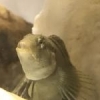Single barbless hooks. That is about it. Really unless you use natural or live bait, you rarely hook a fish deeper than the mouth. Single hooks should make the release easier.The best thing you can do, in my opinion is have a pair of forceps ready, so you do not have to dig around looking for them.
Circle hooks do not work well if you "set" the hook. You should just tighten up the line, with a very slight jerk. Not sure if that will work well with a crankbait. Might work fine. I have a feeling though that they will not work that well. They are made to be hooked into live or natural bait at the end of a flexible line. Put a piece of rigid wood or plastic in the mix, and it may make it difficult for the circle hook to do its job properly.
Fish generally gulp an artificial lure and in less than a second realize that it is not food and try to spit it out. I don't understand how you can be having a problem with them actually swallowing a crankbait. Usually the problem is the opposite, our reaction time is not quick enough to set the hook before the fish spits it. Are you spraying attractant scents on them? I do however understand the problem you may be having with treble hooks. Longer thin baits like a Rapala have that treble hook at the tail, and they are long enough to hook fairly deep. Along with single barbless hooks you might want to try shorter lures.
Relax and desensitize a bit. The best and most devout catch and release anglers still occasionally lose a fish. Realize when the fish is too far gone, and take it to the frying pan. After all catch and release is fairly new (relatively speaking) in the world of angling, throughout time the main focus was putting food on the table.
I still advocate flies. I have great success and have killed very few fish unintentionally with them. If you do not want to learn to fly fish there is always Tenkara, or casting bubbles.










